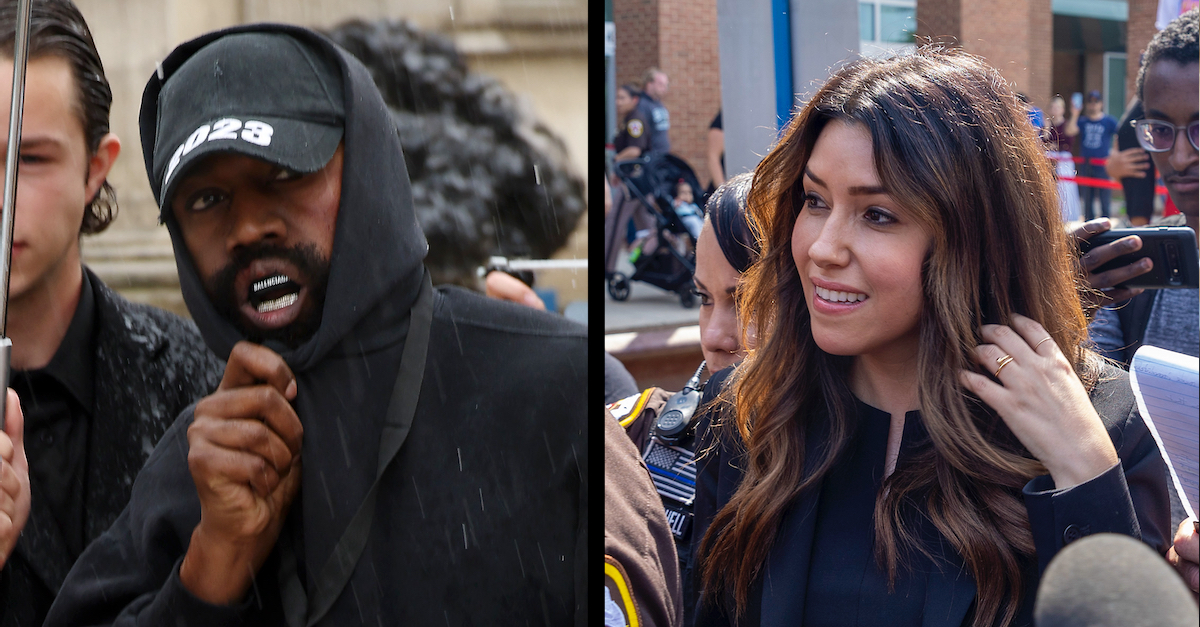
Ye was photographed attending the Givenchy Womenswear Spring/Summer 2023 show as part of Paris Fashion Week on October 2, 2022 in Paris, France. Camille Vasquez was seen departing the Fairfax County Circuit Courthouse on June 1, 2022 in Fairfax, Virginia.
Camille Vasquez, the Brown Rudnick attorney who gained fame by helping actor Johnny Depp score a decisive litigation win against Amber Heard, has dropped Ye, the artist formerly known as Kanye West, as a client. That’s according to reports from TMZ, Page Six, and Yahoo! Entertainment.
Neither Vasquez nor a spokesperson for Brown Rudnick responded to Law&Crime’s emails seeking comment about the matter.
The reported representation was revealed late last week by a Friday TMZ story that was subsequently picked up by the website Consequence and by Yahoo! Entertainment.
“We’re told Camille will be among a group of attorneys representing Kanye’s business interests — contracts, deals, the works,” according to TMZ on Friday.
That has apparently changed — and swiftly.
The reported hiring of Vasquez came as Ye lost a deal with the apparel company Balenciaga. It also came as Ye attempted to negotiate fallout from several anti-Semitic attacks, including some levied on a Piers Morgan broadcast and others levied on Chris Cuomo’s show. As if that wasn’t enough, Ye was also reeling from criticism connected to his comments about the death of George Floyd — which, in turn, led to threats of lawsuits by Floyd’s family.
West also appeared on the podcast Drink Champs on Oct. 16. There, he claimed he could “say anti-Semitic things, and Adidas can’t drop me,” according to a report from Law&Crime’s sister site Mediaite. The podcast interview was reportedly deleted but “emerged online” five days later, Mediaite added.
Adidas released the following statement Tuesday (the company’s use of lowercase letters to refer to itself appears in the original) pushing back against the idea that there was nothing Ye could say to damage their partnership:
adidas does not tolerate antisemitism and any other sort of hate speech. Ye’s recent comments and actions have been unacceptable, hateful and dangerous, and they violate the company’s values of diversity and inclusion, mutual respect and fairness.
After a thorough review, the company has taken the decision to terminate the partnership with Ye immediately, end production of Yeezy branded products and stop all payments to Ye and his companies. adidas will stop the adidas Yeezy business with immediate effect.
This is expected to have a short-term negative impact of up to €250 million on the company’s net income in 2022 given the high seasonality of the fourth quarter.
adidas is the sole owner of all design rights to existing products as well as previous and new colorways under the partnership. More information will be given as part of the company’s upcoming Q3 earnings announcement on November 9, 2022.
In a report that appeared on Monday, one day prior to the loss of the Adidas deal, TMZ said Vasquez “informed her firm . . . she would no longer work with Kanye.”
After that reported personal detachment by Vasquez, the tabloid site said it was “told” that Vasquez’s law firm “still attempted to work with Kanye,” but only if he agreed to “publicly retract his hateful and anti-Semitic words.”
“Our sources say Kanye refused to do so,” TMZ claimed. So Ye, in turn, “fired Brown Rudnick.”
Vasquez was not connected to Ye’s divorce involving Kim Kardashian, according to TMZ. For that case, Ye hired Bob Cohen, who also handled Melinda Gates‘ divorce from Bill Gates, TMZ reported.
If TMZ’s version of the events is true, then Vazquez may have elected to withdraw from the representation using a professional conduct paradigm that is generally common among many states: American Bar Association Model Rule 1.16(b)(4).
That rule allows a lawyer to “withdraw from representing a client if . . . the client insists upon taking action that the lawyer considers repugnant or with which the lawyer has a fundamental disagreement.”
California, where Vasquez is based, has a slightly different version of the rule which is arguably even more broad: “a lawyer may withdraw from representing a client if . . . the client by other conduct renders it unreasonably difficult for the lawyer to carry out the representation effectively.”
It’s unclear whether those precise rules were employed, but they do offer at least some insight into how — and when — representations can be terminated at a lawyer’s behest.
(Photo of Ye by Pascal Le Segretain/Getty Images; photo of Vasquez by Tasos Katopodis/Getty Images.)